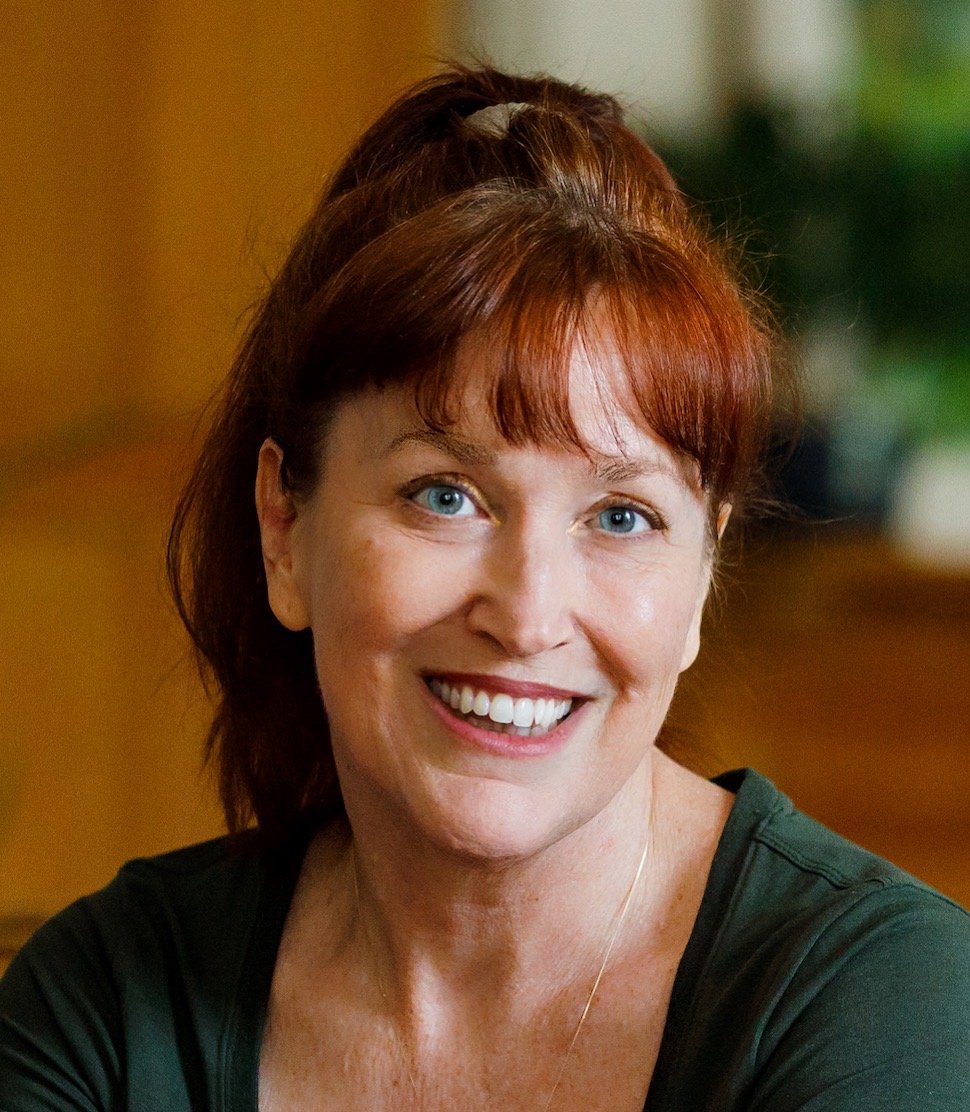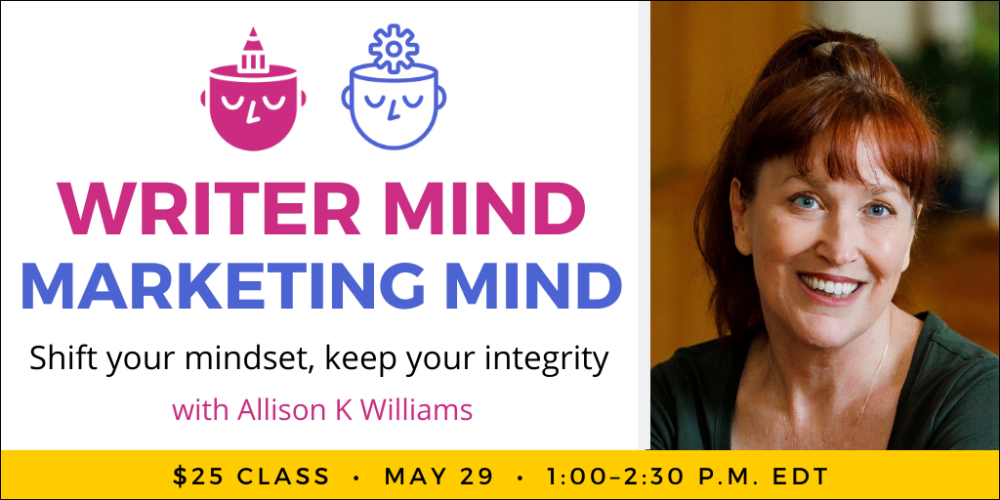
Today’s post is by Allison K Williams (@GuerillaMemoir). Join her on Wednesday, May 29 for the online class Writer Mind, Marketing Mind.
Agent after agent. Editor after editor. “You need more platform!”
They’re right.
“Build a following on social media!”
They’re wrong.
It’s comforting for all of us to believe that social media—so countable, so calculated!—is the answer. That we should spend a chunk of our writing time each day pursuing the little dopamine hits of comments and likes, watching the numbers mount up, working hard to send out love and feel loved back.
But social media is not platform.
Social media does not drive book sales. Social media has never driven book sales. When an influencer sells 10,000 books “on social media,” it is their tool, not their fuel.
Think of constructing a literal platform: a hammer exerts the force to pound a nail. But it didn’t drive itself to the worksite. The hammer is the culmination of architectural plans, engineered into blueprints, supply-chained into piles of lumber and churning bowls of concrete, in a location where people have agreed to show up and pound nails.
Twitter, Instagram or TikTok might deliver the final “buy this” message, but that message is a single nail in your author platform. To have anything to attach that message to, you must first know your mission, discover your best mix of publishing, events, ads and social media, and create an audience who agree to show up and buy books.
As a valuable tool, social media helps nurture relationships built over time through online and real-life interactions in multiple contexts. Making a Reel, hosting a webinar or speaking to a book club will each result in 1-10 people signing up for what you do, even though the Reel reaches over a thousand people and the book club has maybe 10.
But social media channels are not tools to move product. Instead, they train you to produce content that keeps eyeballs on the screen, and to change that content every time “the algorithm” changes or a new product—Reels, anyone?—is rolled out.
Social media channels are built on the unpaid labor of women and children. Meta’s profit model forces their best workers to regularly guess and adapt to new rules, while constantly creating new work, under threats to their livelihoods and their self-esteem. It’s a Hunger Games where the Gamekeepers randomly disable all the weapons you’re carrying and reissue new ones without instructions:
Surprise! No-one sees your Facebook posts unless you pay!
Surprise! No-one sees your Insta posts unless you make video!
And the “walled garden” means if you leave a social network, your audience stays with them—which is why email lists are so important.
Long before issuing the work order, “Buy this book!” you need a platform that supports your mission.
The two kinds of author platforms that sell books
1. The culmination of our life’s work, of who we are. This is the most useful kind of platform. I’ve spent 25 years learning to teach, to write, to edit, and to share that knowledge. Jenny Pentland spent her life being Roseanne Barr’s daughter. Suleika Jaouad spent her life speaking, writing and reporting, eventually about her own illness. Each of these lives has become a book. With a life’s-work platform, writing a book is a logical next step to convey your mission to the world. The book enhances the platform as much as the platform supports the book.
2. A platform deliberately created to support a book, which may or may not become our subsequent life’s work. This kind of platform is built with faster work over a shorter period of time, and it’s what most agents and editors mean when they say, “Build more platform.” Ideally, this platform also builds on what you already love to do and have spent your life caring about.
From these platforms, social media is an economical, low-stakes tool to speak directly to our audience and discover what they want to read. Listen for the gaps in their knowledge, their complaints, their fears, and identify how your book—your mission—fills those gaps and soothes those fears. Build your platform on solving those problems and reaching those readers, often one by one. To paraphrase Margaret Atwood, a conversation after a conversation after a conversation is power.
Social media also allows us to amplify messages we share elsewhere:
- I wrote an essay, here’s a quote on Twitter, go read it.
- I’m speaking at the library, here’s the poster on Instagram, please come.
- My book is on sale, here’s a review quote on Facebook, this is the third of the seven times you’ll hear the title before deciding to buy.
Here’s what you should do before using social media
- Know your mission, why it matters, and who needs your work.
- Have at least three paths to connect with your audience that are not social media—events and appearances, writing and publishing essays, op-eds or blogs, interacting in real-life groups, etc.
- Create an email list and start writing to your audience regularly.
- Be able to write a press release or pitch that serves the magazine/podcast/newspaper’s needs—not just your own.
- Engage regularly with other writers as your colleagues, and copy the behavior of authors you want to be shelved with.
You don’t have to do all of it—but you do have to do some of it.
Writers, stop chasing social media numbers.
Stop working for Instagram.
Use the hammer when it’s the right tool—and stop caring about whether the hammer loves you back.
Note from Jane: If you enjoyed this post, join us on Wednesday, May 29 for the online class Writer Mind, Marketing Mind.

Allison K Williams has edited and coached writers to publication with many of the best-known outlets in media. As a memoirist, essayist, and travel journalist, Allison has written craft, culture and comedy for National Public Radio, CBC-Canada, the New York Times, and many more. She leads the Rebirth Your Book writing retreats series and, as Social Media Editor for Brevity, she inspires thousands of writers with weekly blogs on craft and the writing life. Allison holds an MFA in Creative Writing from Western Michigan University and spent 20 years as a circus aerialist and acrobat before writing and editing full-time. Her latest book is Seven Drafts: Self-Edit Like a Pro From Blank Page to Book (Woodhall Press, 2021). Learn more at her website.


Some of the most sensible advice I’ve read on social media vs. platform! Thanks, Allison. I’m wondering how to answer the question of who might NEED my work, which is narrative history and fiction. Any thoughts?
So glad it’s useful! Well, narrative history is for the people who will be fascinated by these facts, or whose knowledge of their present will be expanded by the context of the past. Who is seeking cultural knowledge? Where are they looking for it? I’d bet there’s a Reddit forum, for starters 🙂 And for fiction – people need to be entertained! Who needs your particular brand of entertainment? Daydreamers? Horror buffs? People who love to see if they can solve the mystery faster than the sleuth? People who want to revel in the beauty of your language?
Excellent advice, useful, inspiring, and insightful. Thank you, Allison. Goes without saying it fits right in at a time when a lot of us are wondering what we think of Twitter possibly shifting gears as per E. Musk. More importantly, you got me thinking about getting on top of tables/platforms wherever I go and doing a dance for my novel in a creative and meaningful way.
And you know, an in-person dance means you can pass out promotional bookmarks.
Great blog post. As someone who offers social media services for authors, I am in agreement. Authors come to social media for book sales, then learn that there isn’t a correlation. Social media is a great place for connecting with readers and colleagues and triggering traffic back to landing pages on a website. However, Facebook & Instagram ads do work.
Yes! Such a great distinction. Depending on the genre, social ads can be very useful!
Thanks, Allison and Jane, this is a really great post. There is a plethora of advice about social media and it can be overwhelming. This, on the other hand, is to the point and makes so much sense.
So glad this is useful!
This is by far and away the best piece of advice I’ve seen in a long time, thank you, Allison! I gave up long ago chasing this social media or that. I now focus on Twitter as my go-to social media. The other being LinkedIn. But most of my energies are employed in building my platform, which I started in 2017 – following a disappointment with a publisher. And, I am pleased to say that, after 5 years of hard labour, I can now see signs of life. It’s hard work but worth every effort – especially for one engaged in a very boring project like mine.
I’m glad to hear that! It really is a long, slow process in little, genuine bits. And I bet your project is incredibly interesting to the right audience, too.
Thanks, Allison, for your perceptive comments. My question is about your suggestion, “Have at least three paths to connect with your audience …” and in particular, your idea to write essays, op-eds and blogs. I’m in a peculiar situation being both a visual artist and writer. The majority of my newsletter subscribers are artists who look for art info and are far less interested in books and the writing life. My blog has focused more on art and artists because if I write about anything else, like issues having to do with writing/publishing or my specific titles, very few newsletter subscribers ever read the blog. In this case would you a) look for a new place to publish essays, perhaps Medium? The idea here would be to keep my blog for artists and start a new place for readers. Or b) start writing essays on my blog about my own written works, publishing, etc. and link to these blogs on social media? (I’m mainly on Twitter, Linked In, and Pinterest) The idea here would be to accept that my artist newsletter subscribers won’t read the blog, but I might get a new reader audience for the blog by linking to it. Thanks.
That’s such a great question! I just advised an author client who also is a visual artist on a similar challenge, and yes – weave in little bits of “hey I also write” in your art, but also start creating writing-oriented work that you specifically direct people to, and that includes moments of “hey I also make art.” And I wonder if there’s a project you could work on that has to do with the intersection of visual art and text (like Jenny Holzer’s work, for example). You might also want to subscribe to Hazel Dooney’s newsletter – she’s a primarily visual artist, but her newsletter is also about the artistic process. Let me know if you’d like me to forward her most recent newsletter to your email that’s attached to your comment?
I read your words, “I wonder if there’s a project you could work on that has to do with the intersection of visual art and text. Oh duh! I make artists books and have for years. My work is actually included in a couple of trade books about artists books and my books are in several collections. Google “artists books” and then click on Images, and you’ll see how diverse this artistic form can be. So yeah! Why didn’t I think of that? Thank you so much! I’ll approach this from that perspective. And yes, please do forward Hazel Dooney’s newsletter. You’re the best, Alllison! Attached is a photo of one of my miniature artists books, ABCs to Live By.
Thanks, Allison. I go back and forth about SM. To date, my best results have come from sending out an email blog to my list twice a month. My biggest challenge there is growing my email list.
Thanks also to Jane for sharing your thoughts.
I am right there with you in the “gosh I should be working on my email list more” boat!
Interesting and this is great, given that social media numbers have been important to every agent or editor I’ve talked with in the last 15 years. Having been an author for all of that time, this is information that I’ve known all along. It’s so good to see the industry evolving in this way.
It’s such an easy metric, but not actually all that useful!
I find this to be all too true. I like to use social media publicity services because they’re fun & really cheap. As for helping sales – meh.
Your words allow me to inhale instead of the anxiety every writer feels after reading they need 50,000 followers. Having spent my career in marketing, we had experts at our ad agencies who specialized in building an audience for clients. They are usually under 35 and use sophisticated software to grow numbers. We charged thousands per month for their expertise. They are not simultaneously writing a memoir. 😀